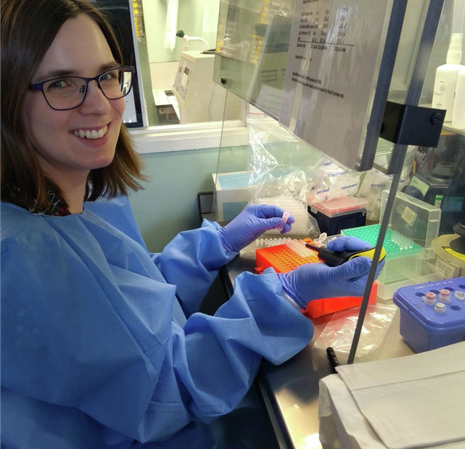Cambridge scientists lead Covid-19 sequencing initiative
The COG-UK initiative, led by Cambridge University researchers, aims to track the mutation and spread of the coronavirus.

As the UK begins mass sequencing of the shifting genetics of Covid-19, the University of Cambridge is leading coordination of COG-UK alongside the Wellcome Sanger Institute, one of the world’s most advanced centres of genomes and data.
COG-UK is a national initiative to sequence the shifting genetics of COVID-19 as fast as possible, providing ‘real time’ data that can help map its spread and detect mutations.
The University and the Wellcome Sanger Institute will coordinate collaboration between expert groups across the UK to analyse the genetic code of Covid-19 samples circulating in the UK. It is hoped that this will give public health agencies and clinicians a unique, cutting-edge tool to combat the virus.
Professor Ian Goodfellow leads the team of volunteer scientists in a tent in a laboratory in Cambridge.
The researchers spend each day working on virus samples sent to them by Public Health England. Their work involves amplifying virus RNA and converting it to DNA for the sequencers.
By analysing the virus genome from confirmed cases of Covid-19 across the country, scientists can monitor changes in the virus at a national scale to further understand how the virus is spreading and whether different strains are emerging.
It is hoped that this will help guide future treatments and assist in monitoring the impact of interventions, ultimately improving the care of patients and bettering clinical outcomes.
Charlotte Houldcroft, one of Cambridge’s research volunteers, describes the sequencing process as a long series of steps, part of which involves repeatedly sticking genetic material to tiny beads, and then washing them with ethanol in order to remove any RNA from other bugs in the nose or throat. If this is done too slowly or too quickly, the virus RNA can diminish.
“The chemical properties of each DNA base change the electrical current in the machine, so it reads DNA really fast”, explains Houldcroft.
“You look at the diversity in the genome and try to wind the clock back: working out what are mutations, when they occurred and so where this strain emerged and how it fits into the UK pattern.”
The scientists generally work in pairs, swapping tasks to provide relief, and double-checking each other’s work.
This is one of the many efforts in Cambridge to tackle the coronavirus. The University has been a key player in national efforts to understand and control the virus, including by investing £20 million to cover the costs of sequencing.
 News / Clare Hall spent over £500k opposing busway 24 December 2025
News / Clare Hall spent over £500k opposing busway 24 December 2025 News / Caius mourns its tree-mendous loss23 December 2025
News / Caius mourns its tree-mendous loss23 December 2025 Comment / The ‘class’ of Cambridge24 December 2025
Comment / The ‘class’ of Cambridge24 December 2025 Comment / Yes, I’m brown – but I have more important things to say22 December 2025
Comment / Yes, I’m brown – but I have more important things to say22 December 2025 Interviews / Politics, your own way: Tilly Middlehurst on speaking out21 December 2025
Interviews / Politics, your own way: Tilly Middlehurst on speaking out21 December 2025










